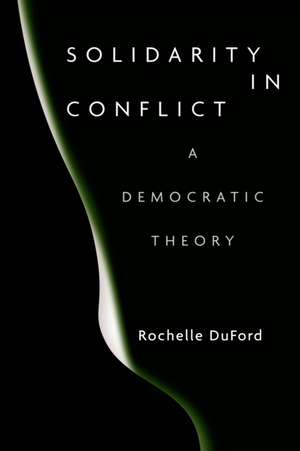Solidarity in Conflict – A Democratic Theory
Autor Rochelle Duforden Limba Engleză Hardback – 14 mar 2022
DuFord argues that solidarity is best understood as a set of relations, one agonistic and one antagonistic: the solidarity groups' internal organization and its interactions with the broader world. Such a picture of solidarity develops through careful consideration of the conflicts endemic to social relations and solidarity organizations. Examining men's rights groups, labor organizing's role in recognitional protections for LGBTQ members of society, and the debate over trans inclusion in feminist praxis, DuFord explores how conflict, in these contexts, becomes the locus of solidarity's democratic functions and thereby critiques democratic theorizing for having become either overly idealized or overly focused on building and maintaining stability. Working in the tradition of the Frankfurt School, DuFord makes a provocative case that the conflict generated by solidarity organizations can address a variety of forms of domination, oppression, and exploitation while building a democratic society.
Preț: 515.19 lei
Nou
Puncte Express: 773
Preț estimativ în valută:
98.58€ • 107.42$ • 83.07£
98.58€ • 107.42$ • 83.07£
Carte tipărită la comandă
Livrare economică 23 aprilie-07 mai
Preluare comenzi: 021 569.72.76
Specificații
ISBN-13: 9781503628885
ISBN-10: 1503628884
Pagini: 216
Dimensiuni: 190 x 235 x 22 mm
Greutate: 0.45 kg
Editura: MK – Stanford University Press
ISBN-10: 1503628884
Pagini: 216
Dimensiuni: 190 x 235 x 22 mm
Greutate: 0.45 kg
Editura: MK – Stanford University Press
Notă biografică
Rochelle DuFord is Assistant Professor of Philosophy at University of Hartford.
Cuprins
Introduction
1. Solidarity in Neoliberal Times
2. Two Models of Nonexclusion: Solidarity in Feminist and Democratic Theory
3. Antisocial Solidarities: The Psychic Life of Domination
4. Burdened Action: The Social Formation of Solidarity
5. A More Perfect Union: The Ends of Conflict
Conclusion: Solidarity Today
1. Solidarity in Neoliberal Times
2. Two Models of Nonexclusion: Solidarity in Feminist and Democratic Theory
3. Antisocial Solidarities: The Psychic Life of Domination
4. Burdened Action: The Social Formation of Solidarity
5. A More Perfect Union: The Ends of Conflict
Conclusion: Solidarity Today
